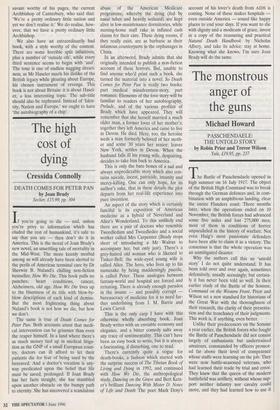The high cost of dying
Cressida Connolly
DEATH COMES FOR PETER PAN If you're going to die — and, unless you're privy to information which has eluded the rest of humankind, it's safe to say that you are — then don't do it in America. This is the moral of Joan Brady's new novel, an unsettling tale of mortality in the Mid-West. The more keenly morbid among us will already have been alerted to the perils of American terminal care by Dr Sherwin B. Nuland's chilling non-fiction bestseller, How We Die. This book pulls no punches: heart conditions, cancer, Alzheimers, old age. How We Die lives up to the bluntness of its title with blow-by- blow descriptions of each kind of demise. But the most frightening thing about Nuland's book is not how we die, but how we don't.
The same is true of Death Comes for Peter Pan. Both accounts attest that medi- cal intervention can be grimmer than even the reaper himself. In a land where there's as much money tied up in medical litiga- tion as the GNP of a small European coun- try, doctors can ill afford to let their patients die for fear of being sued by the bereaved. And a doctor's vocation is any- way predicated upon the belief that life must be saved, prolonged. If Joan Brady has her facts straight, she has stumbled upon another obstacle on the bumpy path to eternity. She has uncovered a scandalous abuse of the American Medicare programme, whereby the dying (fed by nasal tubes and heavily sedated) are kept alive in low-maintenance dormitories, while nursing-home staff rake in inflated cash claims for their care. These dying rooms, if they really exist, are as barbaric as their infamous counterparts in the orphanages in China.
In an afterword, Brady admits that she originally intended to publish a non-fiction account of these horrors. But, unable to find anyone who'd print such a book, she turned the material into a novel. So Death Comes for Peter Pan is really two books: part medical misadventure-story, part romance. Elements of the love story will be familiar to readers of her autobiography, Prelude, and of the various profiles of Brady which have appeared. They will remember that she herself married a much older man, a former lover of her mother's; together they left America and came to live in Devon. He died. Here, too, the heroine weds a man formerly beloved of her moth- er and some 30 years her senior; leaves New York, settles in Devon. When the husband falls ill his young wife, despairing, decides to take him back to America.
This is only the bare bones of a sad and always unpredictable story which also con- tains suicide, incest, patricide, insanity and mercy-killing. One can only hope, for its author's sake, that in these details the plot departs from her real-life experience into pure invention. An aspect of the story which is certainly fanciful is its exposition of American medicine as a hybrid of Neverland and Alice's Wonderland. To this unlikely end there are a pair of doctors who resemble Tweedledum and Tweedledee and a social worker called Mrs Carpenter (Brady stops short of introducing a Mr Walrus to accompany her, but only just). There's a grey-haired old woman who is likened to Tinker-Bell; the wide-eyed young wife is called Alice. The hero, who lives up to his namesake by being maddeningly puerile, is called Peter. These analogies between fantasy-world and hospital are forced and irritating. There is already enough paradox in the insane — and possibly corrupt — bureaucracy of medicine for it to need fur- ther underlining from J. M. Barrie and Lewis Carrol.
This is the only carp I have with this otherwise wholly absorbing book. Joan Brady writes with an enviable economy and elegance, and a bitter comedy salts away any trace of sentimentality. This can't have been an easy book to write, but it is always a fascinating, if disturbing, one to read.
There's currently quite a vogue for death-books, a fashion which started with the surprise success of The Tibetan Book of Living and Dying in 1992, and continued with How We Die, the anthropological study, Dancing on the Grave and Bert Keiz- er's brilliant Dancing With Mister D: Notes of Life and Death The poet Mark Doty's account of his lover's death from AIDS is coming. None of these makes hospitals — even outside America — sound like happy places to end your days. If you want to die with dignity and a modicum of grace, invest in a copy of the reassuring and practical Natural Death Handbook by Nicholas Albery, and take its advice: stay at home. Knowing what she knows, I'm sure Joan Brady will do the same.


























































 Previous page
Previous page